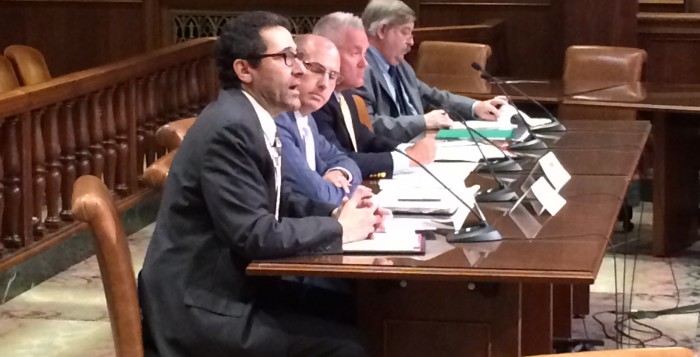Children’s Champions — Thank you for This Privilege!
My Dear Friends, Colleagues, and Fellow Children’s Champions:
RCPA Announces New Director of Children’s Division
RCPA is pleased to announce the hiring of Robena Spangler as the new director for its Children’s Division. Robena has worked for NHS Human Services for many years in several key positions, including operations resource specialist, regional director – children’s services, director of out of home services and gender responsive services, and children and youth program specialist. In addition to her bachelor’s degree in sociology/human services, she holds an MS degree in leadership and professional advancement from Duquesne University.
Robena will begin in this position on September 26 – just in time for the RCPA Annual Conference. As many of you know, Connell O’Brien serves as the current children’s services director and will be retiring. Connell will remain with RCPA to assist in the transition and to continue with select initiatives. Please join us in welcoming Robena to RCPA!
RCPA Board of Directors Announcement
The RCPA Board of Directors is pleased to announce the appointment of Steven Alwine, CEO of HealthSouth Rehabilitation Hospital of York, as its newest member. Steve has worked at HealthSouth for almost 25 years. He was promoted in 2002 to chief financial officer at HealthSouth Nittany Valley and returned to York in 2011 as chief executive officer. He currently fills a vacancy for an unexpired term ending June 30, 2017, as an RCPA director-at-large.
In addition, the board also selected Charles Barber, CEO of Erie County Care Management, Inc., to complete the unexpired term ending June 30, 2017, as board treasurer. Charlie has already been serving on the RCPA Board of Directors, but was recently voted to fill the vacant officer position of treasurer.
Join us in congratulating these individuals in their appointments. For a complete listing of the RCPA board members, please visit our website.
Community HealthChoices MCOs Announced
The Departments of Human Services (DHS) and Aging just announced their selection of three managed care organizations (MCOs) for Community HealthChoices (CHC). CHC will coordinate physical health and long-term services and supports (LTSS) to individuals who are dually eligible for Medicare and Medicaid, older Pennsylvanians, and individuals with disabilities.
Through a review of a request for proposals, the following MCOs have been selected to proceed with negotiations to deliver services statewide in Pennsylvania beginning in 2017:
- AmeriHealth Caritas
- Pennsylvania Health and Wellness (Centene)
- UPMC for You
CHC will roll out in three phases. Persons eligible for CHC are individuals aged 21 or older who have both Medicare and Medicaid, or who receive long-term services and supports through Medicaid because they need help with everyday activities of daily living.
Information from DHS Webinar: Act 62 Next Steps for Providers and Families
On August 25, RCPA, in collaboration with key state agencies, hosted a webinar on changes impacting providers of child and adolescent autism services as well as HealthChoices managed care organizations. The webinar also reviewed the use of behavioral health, physical health, and rehabilitation procedure codes that reflect services for the diagnostic assessment and treatment of ASD covered under Act 62. The procedure codes that are on the MA Program fee schedule will be subject to the cost avoidance process for MA FFS claims beginning September 30.
The webinar also included a review of updated information and guidance for families that providers can duplicate and make available to families of children with an autism spectrum disorder. Visit the DHS Act 62 web page for resources to use when communicating with families, including:
- Fact Sheet
- Frequently Asked Questions
- How to Appeal
- Sample Appeal Letters
- Act 62 Infographics
Representatives from the Department of Human Services (DHS) and the Insurance Department reviewed the recently issued Medical Assistance (MA) Bulletin for providers relating to Act 62 titled, Payment of Claims for Services Provided to Children and Adolescents for the Diagnostic Assessment and Treatment of Autism Spectrum Disorder (ASD). The purpose of this bulletin is to remind providers enrolled in the MA Program, both fee-for-service and HealthChoices, of the requirement to bill a child’s or adolescent’s private health insurance company before submitting a claim for the diagnostic assessment or treatment of ASD. New codes will be implemented by September 30. The recording of the webinar is available for review. The Power Point presentations for both the managed care and the service provider presentations are also now available.
Webinar: Act 62 Next Steps for Providers and Families
RCPA is collaborating with key state agencies to host a very important webinar on changes impacting providers of child and adolescent autism services as well as HealthChoices managed care organizations. Representatives from the Department of Human Services (DHS) will review Act 62 of 2008, billing guidance for providers, and the revised ICD-10 diagnostic codes and intervention procedure codes related to children and adolescents with autism spectrum disorders. These codes may apply to both commercial health plans and Medical Assistance plans. The webinar will also include updated information and guidance for families. Registration is now open for both sections of the webinar.
The webinar will be held in two sessions on Thursday, August 25, 2016:
- Session 1, 12:00–1:00 pm: The target audience for this webinar session is BH-MCOs, counties, and county oversight organizations.
- Session 2, 1:00–2:00 pm: The target audience for this webinar session is behavioral health and pediatric rehabilitation provider organizations.
All participants are welcome to sit in for either or both sessions. Both webinars will be recorded and made available on RCPA and state websites. The DHS Bulletin related to the changes in diagnostic and intervention procedure will be sent to members once it is issued.
Testimony on DOL Overtime Rule
On Tuesday, June 21, 2016, RCPA President & CEO Richard Edley testified before a joint hearing of the PA Senate Labor & Appropriations Committees, regarding the adverse effects of the Federal Department of Labor’s (DOL) Overtime Exemption Rule.
Highmark Moves toward Parity and Integrated Care
A recent edition of the Pittsburgh Post-Gazette focused on the planning efforts by Highmark Insurance to assure health care parity and the economic and health care value of integrated health care.
The Post-Gazette article notes that “behavioral health care is still provided under a “separate and unequal” system, eight years after enactment of a federal law that meant to curb such disparity,” noted Patrick Kennedy in a meeting with a group of Pittsburgh-area health insurance caseworkers. “But that may start to change by fall when employer compliance monitoring is expected to begin for the Mental Health Parity and Addiction Equity Act,” the 49-year-old former Rhode Island congressman told about 20 case managers at Highmark Health. Mr. Kennedy was upbeat, saying a renaissance was at hand as employers and insurers learn about the cost-saving value of behavioral health coverage. “The business model isn’t there yet. This is going to take time,” he said. “Let’s find the value so it makes sense for insurance companies.”
In a related effort, the Pennsylvania Parity Coalition will be meeting this week with the Pennsylvania Insurance Department, to discuss the implementation and monitoring of commercial insurance plans as part of the federal parity requirements in the move toward integrated health care. RCPA, along with leading provider and consumer advocacy groups and representatives of ParityTrack, supported by the Kennedy Forum, make up the core leadership of the Pennsylvania Parity Coalition.
Working to Advance Youth Suicide Prevention
Research position or fellowship in suicide prevention research in schools
Leaders in mental health and suicide prevention research are working to implement a grant to study an evidence-based approach to youth suicide prevention. They are now looking for a project coordinator (masters or doctoral level preferred) and a research assistant (BA level) to run a large, school-based suicide prevention study with teachers in urban and suburban middle and high schools in Pennsylvania. This project will study a promising prevention model by recruiting 30 schools and training over 1,000 teachers.
The work of the research team will involve identifying schools, working with school personnel to plan the training, implementation of the assessment system, coordinating the training, and collecting pre-, post-, and follow-up quantitative and qualitative data. Both the project coordinator and research assistant are 18-month positions starting September 1. Interested individuals should send their resumes with cover letters to Guy Diamond, PhD and Matthew Wintersteen, PhD.
RCPA has played a long-standing role in the Pennsylvania Youth Suicide Prevention Initiative and works in collaboration with state and local organizations to reduce the risk and rate of youth suicide in communities across the Commonwealth.

















